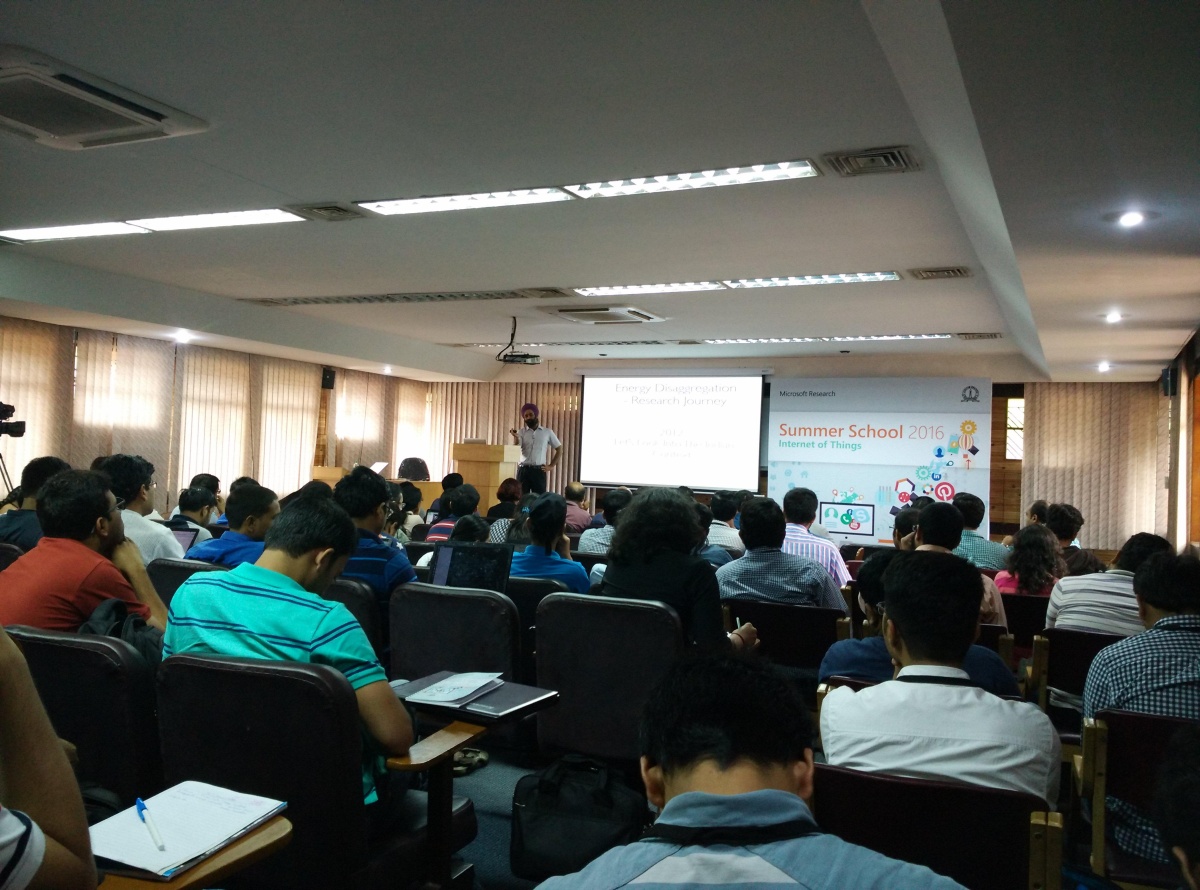Location:
Department of Computational and Data Sciences
Shishir G. Patil*

Amarjeet Singh, Chief Technology Officer, Zenatix, addressing the participants at the Summer School (Courtesy: Microsoft India)
A summer school on Internet of Things (IoT) was conducted by Microsoft Research India (MSR India) in collaboration with the Department of Computational and Data Sciences (CDS) at IISc from 20–25 June, 2016. The participants were students invited from academic institutions across the country.
This summer school was part of an annual series which aims to provide an opportunity for students to learn the fundamentals of a subject as well as state-of-the-art research. This year’s theme, IoT, refers to the networking of physical objects through the use of embedded sensors, actuators, and other devices that can collect and transmit information about the environment around them. The data collected from these devices can then be used to deliver various products and services. Analysts estimate that by 2020, we are likely to have about 30 to 50 billion connected devices globally. In India, the potential for IoT devices is enormous. These devices are expected to be used in applications ranging from air-quality monitoring to traffic management.
There were three invited talks each day followed by a lab session/tutorial/panel discussion, during which students interacted with the resource persons. The talks were on diverse topics, and began with an introduction to the topic, leading to a discussion on problems open to research. Ronak Sutaria, an independent researcher in Mumbai, spoke about his work on developing low-cost, efficient devices for monitoring the quality of air. In an intense mathematical session featuring cutting-edge research, Ashish Kapoor (MSR) introduced the students to mathematical modeling and analysis of wind flow data from multiple points on aircrafts (called swarm sensing) to optimize flight routes. Ranveer Chandra (MSR) shared his research on enabling IoT devices in farms to collect data on nutrients and moisture content in the soil. KVS Hari (ECE, IISc) demonstrated how cars could be identified based on their electromagnetic signatures, one small puzzle on the road to the development of self-driving cars. Other speakers included Zainul Charbiwala (Tricog Health), Marco Gruteser (Rutgers University), and Shaz Qadeer (MSR).
The last day of the summer school saw a “hackathon”, in which the students, divided into teams, had to come up with solutions to technological problems using kits of Raspberry-Pi, Arduino, elemental sensors and Azure cloud offerings. The event culminated with demonstrations of the projects by the respective teams. The winning team built a working model for indoor security that displays, in a smartphone app in real-time, information from sensors installed in a home. Efforts by other teams included a smart transportation system which can send alerts about road condition, parking availability and vehicle location to drivers and emergency responders, and a smart refrigerator which can send alerts when it’s time to refill its stock of vegetables and fruits. All the code and documentation from the hackathon was made available online for the benefit to the broader community.
Speaking to CONNECT, Yogesh Simmhan, one of the organizers of the summer school, said, “The summer school provides an opportunity for students to get exposed to cutting-edge research at global standards. It also helps participating students from across the country to learn more about current research and opportunities at IISc.”
*Shishir G. Patil is a Research Intern at the Centre for Nano Science and Engineering


